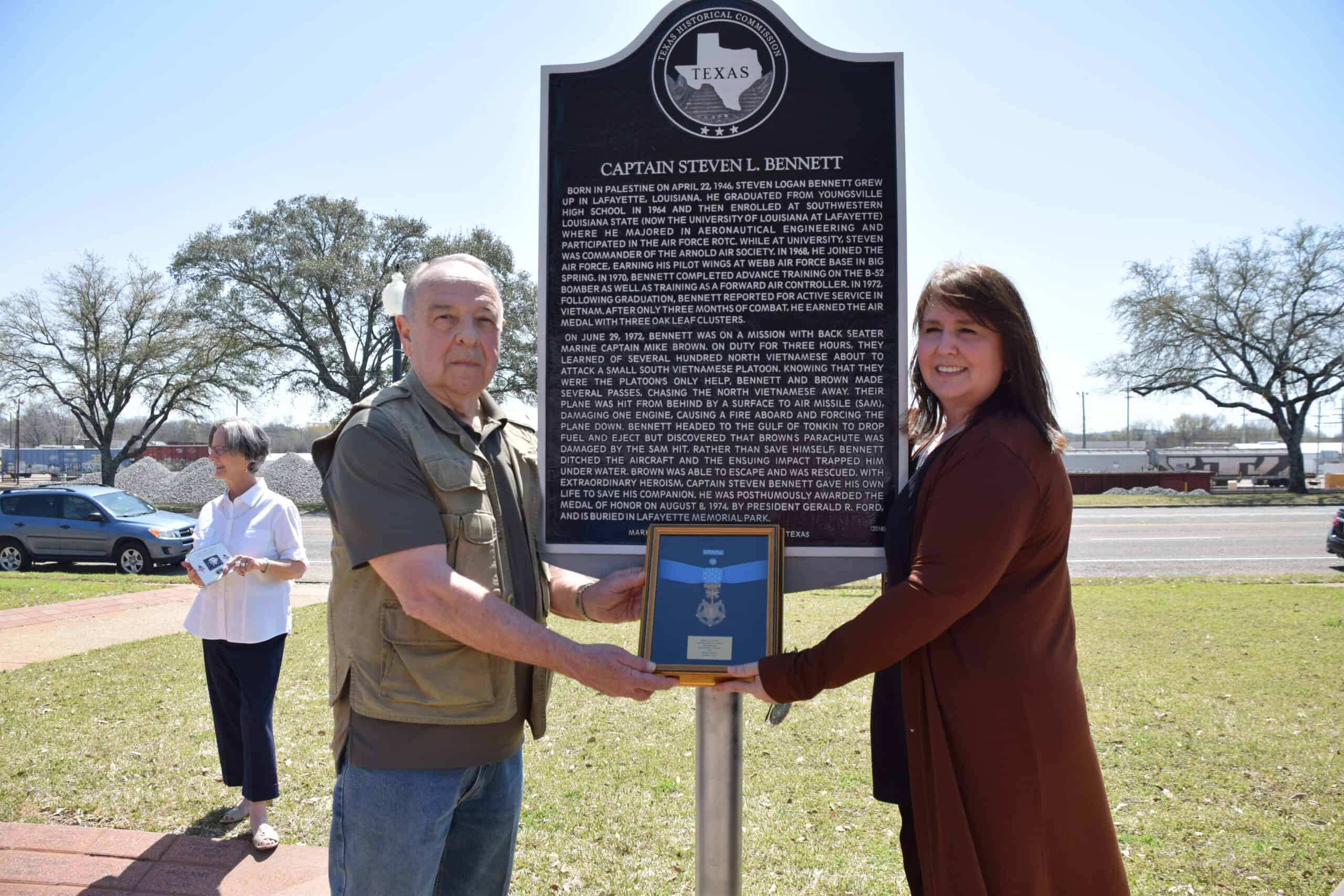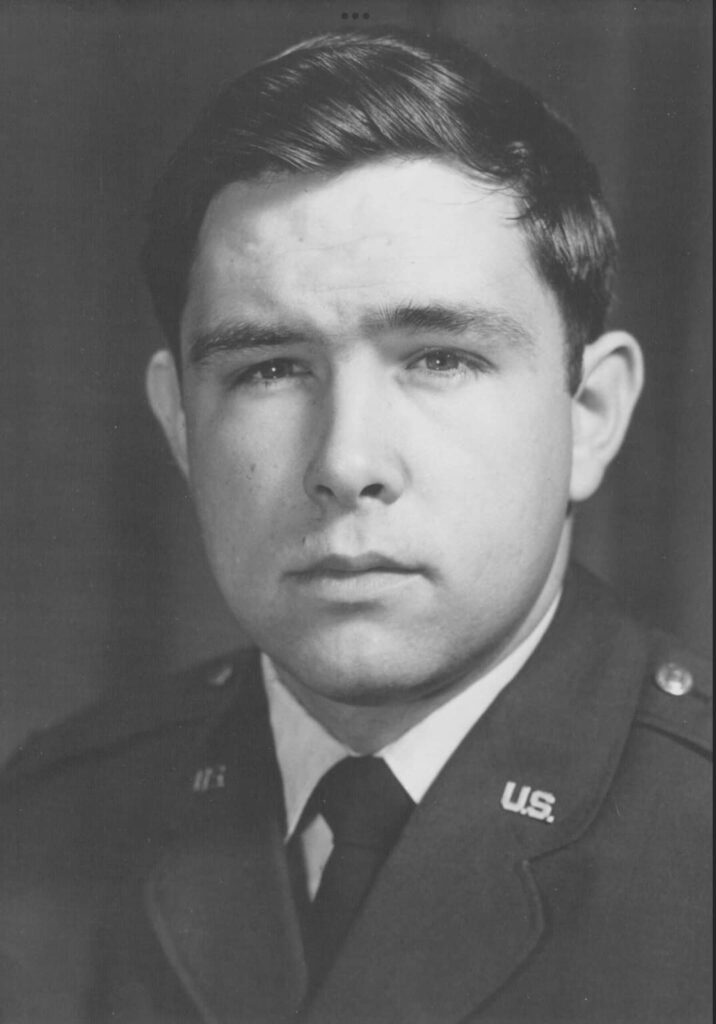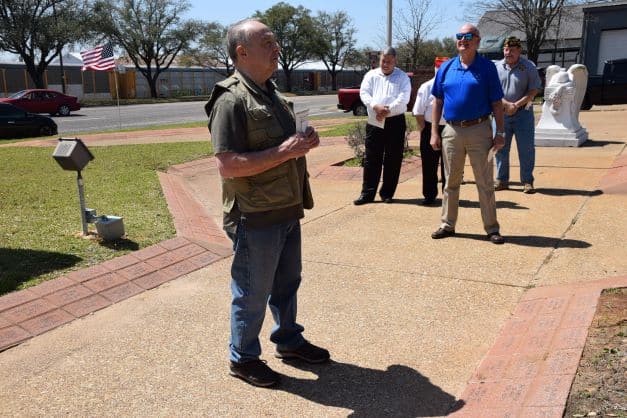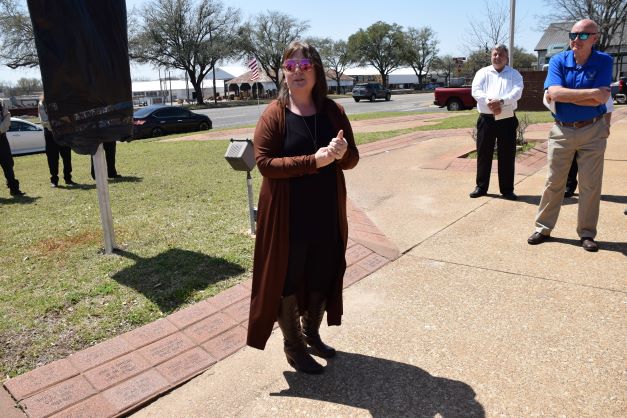Medal of Honor Recipient Honored in Palestine

Historical Marker Unveiled at Veterans Memorial Park
By Will Johnson
Messenger Reporter
PALESTINE – The Medal of Honor is the highest military decoration that may be awarded by the United States government. It is presented by the President of the United States, in the name of Congress, and is conferred only upon members of the United States Armed Forces who distinguish themselves through conspicuous gallantry and intrepidity at the risk of life above and beyond the call of duty:
- While engaged in action against an enemy of the United States;
- While engaged in military operations involving conflict with an opposing foreign force; or
- While serving with friendly foreign forces engaged in an armed conflict against an opposing armed force in which the United States is not a belligerent party.
To date, there have been 3,530 Medals of Honor presented to service members since its inception in July of 1862 and one of those recipients was honored on Saturday, March 26 with the unveiling of a Texas Historical Marker in Palestine’s Veteran’s Park.

Capt. Steven L. Bennett was born in Palestine on April 22, 1946 and was killed in action on June 29, 1972 when the plane he was piloting crashed into the Gulf of Tonkin in Vietnam. He received the Medal of Honor for heroism during the Vietnam War on August 8, 1974.

Prior to the unveiling of the marker, a dedication ceremony was held. The haunting sound of “Amazing Grace” played on bagpipes served as the prelude to the opening remarks by David Franklin, Chairman of the Anderson County Historical Commission.
After welcoming those in attendance, Franklin said, “This is the 50th anniversary of Capt. Bennett’s sacrifice. He is one of our own. A native of Anderson County and to my knowledge, he is the only native of Anderson County that won the Medal of Honor. I would especially like to welcome his daughter Angela-Bennett Engele and his partner in the aircraft Major Mike Brown.”
Following the invocation from USMC Vietnam Veteran Rod Skelton and a welcome from Anderson County Judge Robert Johnston, Franklin requested Maj. Brown to address the audience.
The retired Marine Corps officer said he was assigned as an observer with Capt. Bennett in an OV-10 aircraft to patrol an area south of Quang Tri in Vietnam.
“We got a call from the advisor to the South Vietnamese marines. He said there was a platoon of Vietnamese Marines out there with a Marine Warrant Officer. He said they were going across a gravel road with a creek running underneath it and a fork in it. HE said there were about 300 North Vietnamese who were coming after those 40 Marines,” he said.
Unfortunately, there was no air support available, Brown indicated. He said if any Naval guns were fired there was a high likelihood the Marines would also be hit.

The retired Major said they were in a pickle but added the OV-10 Bronco had M-60 machine guns on each wing with approximately 500 rounds each.
“I told Steve we have to do something. He told me to get permission and we’ll do it,” he said. “To this day, I never have known if we got permission or not. I said do something Steve and he said that’s right, we’re going in. That’s the kind of guy he was.”
Brown said they made four strafing passes “… and as we’re pulling out of the fourth strafing pass, a missile hit our left engine.”
He said the missile ripped a hole in the plane and had damaged his parachute. Brown added in the OV-10, the rear seat had to go out first in an ejection or the front seat ejection rockets would blow back into the rear seat and kill the observer.
“He chose to keep on flying and put it out over the water so I might have a chance to survive. The Air Force knew this but apparently pilots don’t survive in an OV-10 when it breaks up over the water. I didn’t know this. They had some of the best ejection seats in the world and never even thought about putting it in the water,” he explained.
Looking back over all the Medal of Honor recipients, Brown said there was a common thread. Other than humility, he said most of the acts of heroism were instantaneous.
Capt. Bennett, on the other hand, probably knew for eight to 10 minutes prior to putting the plane in the water that he was most likely going to die, “… but he did it anyway.”
Brown said when the plane hit the water, it cartwheeled. Eventually, Brown managed to dislodge himself from the cockpit. He said he tried several times to rescue his friend but was unsuccessful.
Once Brown concluded, Angela-Bennett Engele – Capt. Bennett’s daughter – addressed the attendees.
“My dad was born here in Palestine but he did move away when he was about two. They moved to Lafayette, LA. So, he’s buried in Lafayette. If you’re ever there you can go see him there. I really appreciate this being done because the family that is here can come and visit now. We have Steven Bennett Park and we the monument over there, but I think this is extra special. It will last forever and ever,” she said.

According to the citation for the award, signed by President Gerald R. Ford, “Capt. Bennett was the pilot of a light aircraft flying an artillery adjustment mission along a heavily defended segment of route structure. A large concentration of enemy troops was massing for an attack on a friendly unit.
“Capt. Bennett requested tactical air support but was advised that none was available. He also requested artillery support, but this too was denied due to the close proximity of friendly troops to the target. Capt. Bennett was determined to aid the endangered unit and elected to strafe the hostile positions. After four such passes, the enemy forces began to retreat.
“Capt. Bennett continued the attack, but, as he completed his fifth strafing pass, his aircraft was struck by a surface-to-air missile which severely damaged the left engine and the left main landing gear. As fire spread in the left engine, Capt. Bennett realized that recovery at a friendly airfield was impossible.
“He instructed his observer to prepare for ejection, but was informed by the observer that his parachute had been shredded by the force of the impacting missile. Although Capt. Bennett had a good parachute, he knew that if he ejected, the observer would have no chance of survival.
“With complete disregard for his own life, Capt. Bennett elected to ditch the aircraft into the Gulf of Tonkin, even though he realized that a pilot of this type aircraft had never survived a ditching. The ensuing impact upon the water caused the aircraft to cartwheel and severely damage the front cockpit, making escape for Capt. Bennett impossible. The observer successfully made his way out of the aircraft and was rescued.
“Capt. Bennett’s unparalleled concern for his companion, extraordinary heroism, and intrepidity above and beyond the call of duty, at the cost of his life, were in keeping with the highest traditions of the military service and reflect great credit upon himself and the U.S. Air Force.”
Will Johnson may be contacted via e-mail at [email protected].






